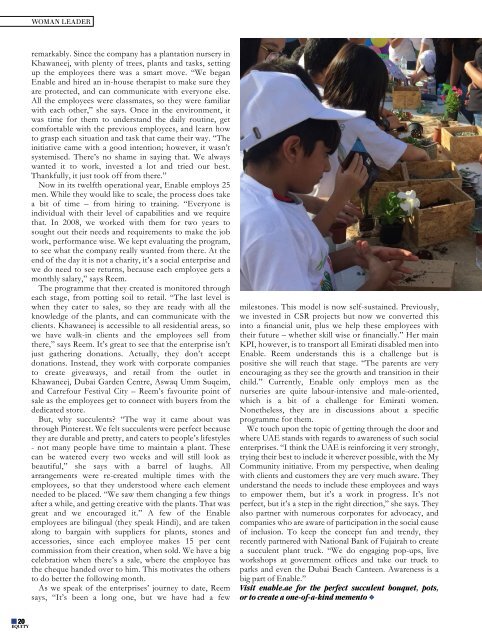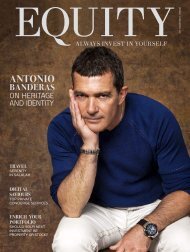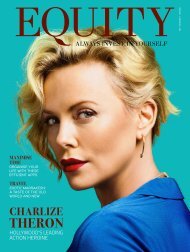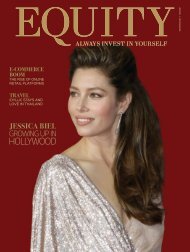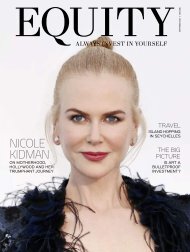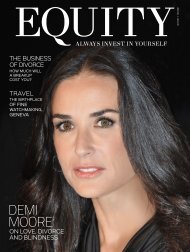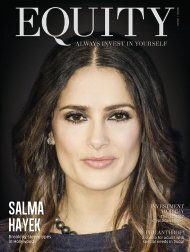You also want an ePaper? Increase the reach of your titles
YUMPU automatically turns print PDFs into web optimized ePapers that Google loves.
WOMAN LEADER<br />
remarkably. Since the company has a plantation nursery in<br />
Khawaneej, with plenty of trees, plants and tasks, setting<br />
up the employees there was a smart move. “We began<br />
Enable and hired an in-house therapist to make sure they<br />
are protected, and can communicate with everyone else.<br />
All the employees were classmates, so they were familiar<br />
with each other,” she says. Once in the environment, it<br />
was time for them to understand the daily routine, get<br />
comfortable with the previous employees, and learn how<br />
to grasp each situation and task that came their way. “The<br />
initiative came with a good intention; however, it wasn’t<br />
systemised. There’s no shame in saying that. We always<br />
wanted it to work, invested a lot and tried our best.<br />
Thankfully, it just took off from there.”<br />
Now in its twelfth operational year, Enable employs 25<br />
men. While they would like to scale, the process does take<br />
a bit of time – from hiring to training. “Everyone is<br />
individual with their level of capabilities and we require<br />
that. In 2008, we worked with them for two years to<br />
sought out their needs and requirements to make the job<br />
work, performance wise. We kept evaluating the program,<br />
to see what the company really wanted from there. At the<br />
end of the day it is not a charity, it’s a social enterprise and<br />
we do need to see returns, because each employee gets a<br />
monthly salary,” says Reem.<br />
The programme that they created is monitored through<br />
each stage, from potting soil to retail. “The last level is<br />
when they cater to sales, so they are ready with all the<br />
knowledge of the plants, and can communicate with the<br />
clients. Khawaneej is accessible to all residential areas, so<br />
we have walk-in clients and the employees sell from<br />
there,” says Reem. It’s great to see that the enterprise isn’t<br />
just gathering donations. Actually, they don’t accept<br />
donations. Instead, they work with corporate companies<br />
to create giveaways, and retail from the outlet in<br />
Khawaneej, Dubai Garden Centre, Aswaq Umm Suqeim,<br />
and Carrefour Festival City – Reem’s favourite point of<br />
sale as the employees get to connect with buyers from the<br />
dedicated store.<br />
But, why succulents? “The way it came about was<br />
through Pinterest. We felt succulents were perfect because<br />
they are durable and pretty, and caters to people’s lifestyles<br />
- not many people have time to maintain a plant. These<br />
can be watered every two weeks and will still look as<br />
beautiful,” she says with a barrel of laughs. All<br />
arrangements were re-created multiple times with the<br />
employees, so that they understood where each element<br />
needed to be placed. “We saw them changing a few things<br />
after a while, and getting creative with the plants. That was<br />
great and we encouraged it.” A few of the Enable<br />
employees are bilingual (they speak Hindi), and are taken<br />
along to bargain with suppliers for plants, stones and<br />
accessories, since each employee makes 15 per cent<br />
commission from their creation, when sold. We have a big<br />
celebration when there’s a sale, where the employee has<br />
the cheque handed over to him. This motivates the others<br />
to do better the following month.<br />
As we speak of the enterprises’ journey to date, Reem<br />
says, “It’s been a long one, but we have had a few<br />
milestones. This model is now self-sustained. Previously,<br />
we invested in CSR projects but now we converted this<br />
into a financial unit, plus we help these employees with<br />
their future – whether skill wise or financially.” Her main<br />
KPI, however, is to transport all Emirati disabled men into<br />
Enable. Reem understands this is a challenge but is<br />
positive she will reach that stage. “The parents are very<br />
encouraging as they see the growth and transition in their<br />
child.” Currently, Enable only employs men as the<br />
nurseries are quite labour-intensive and male-oriented,<br />
which is a bit of a challenge for Emirati women.<br />
Nonetheless, they are in discussions about a specific<br />
programme for them.<br />
We touch upon the topic of getting through the door and<br />
where UAE stands with regards to awareness of such social<br />
enterprises. “I think the UAE is reinforcing it very strongly,<br />
trying their best to include it wherever possible, with the My<br />
Community initiative. From my perspective, when dealing<br />
with clients and customers they are very much aware. They<br />
understand the needs to include these employees and ways<br />
to empower them, but it’s a work in progress. It’s not<br />
perfect, but it’s a step in the right direction,” she says. They<br />
also partner with numerous corporates for advocacy, and<br />
companies who are aware of participation in the social cause<br />
of inclusion. To keep the concept fun and trendy, they<br />
recently partnered with National Bank of Fujairah to create<br />
a succulent plant truck. “We do engaging pop-ups, live<br />
workshops at government offices and take our truck to<br />
parks and even the Dubai Beach Canteen. Awareness is a<br />
big part of Enable.”<br />
20<br />
EQUITY


